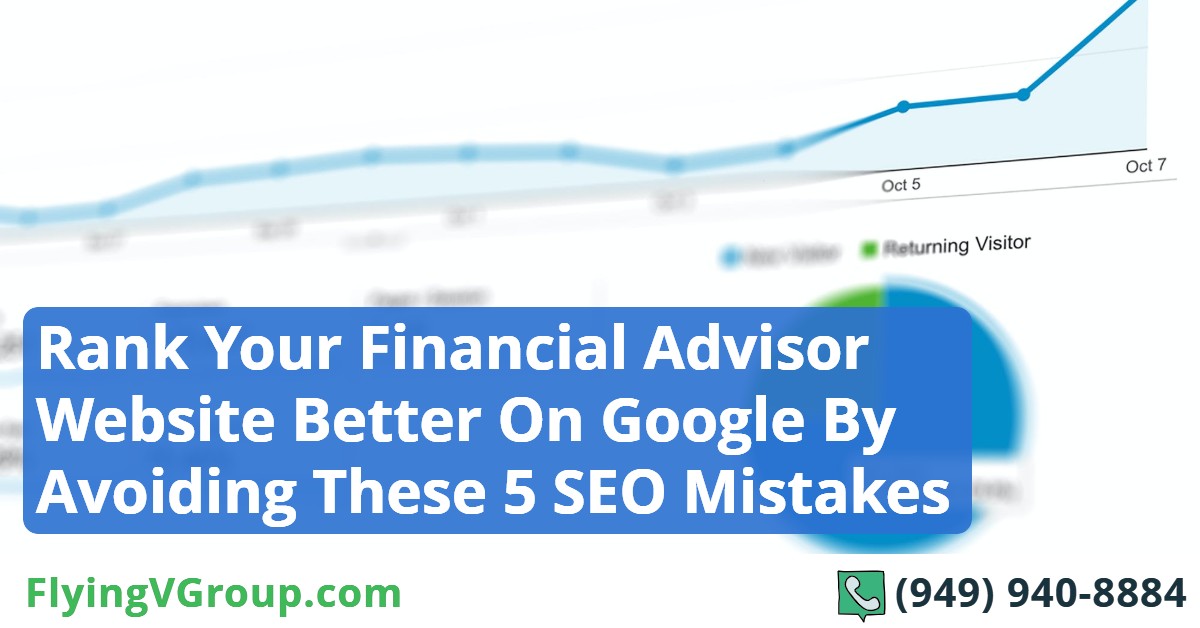Are you wondering why your website isn’t ranking well on Google after all the sweat and tears you – your team or SEO company – put into search engine optimization?
Maybe your financial advisor website used to rank well in the past. Now, you are wondering why this isn’t the case anymore since you haven’t changed anything. Even worse, although you made some improvements the effects are minuscule to none.
Unfortunately, search engine optimization and its rules have never stayed the same for long, especially in recent years. This has always been a tough game as Google constantly changes its algorithm, therefore, leaving you stranded not knowing where to go next and, more importantly, what to do.
Furthermore, it turns out that it is often not what you should do that is important, but rather what you should avoid doing. Many SEO practices that used to be pertinent to your ranking just 5 years ago, are no longer relevant.
Worst of all, not only are these tactics not useful, they are also bad for your ranking since Google may penalize you for using them.
However, before you give up your SEO efforts, remember the bigger picture and that Google is actually trying to help and not harm with these changes.
Kathryn Aragon, an award-winning marketer, author, content strategist, and consultant says the following on the topic:
“Search engines aren’t trying to make life harder for website owners. They see search as a product, and as they improve their product, the game changes by default.”
Evergreen tactics like matching your content to search intent, addressing the common questions and concerns of your target audience with your content, and building quality backlinks are still preferred by crawlers. Furthermore, these practices have become the main focus of Google’s latest updates.
It is vital to adapt as soon as possible to the latest trends in SEO. However, if you ignore the 5 common SEO mistakes it could be detrimental to your financial services website ranking in 2020.
So without further ado let’s begin:
#1. Using Black Hat SEO For Link Building
It is human nature to always search for a shortcut to achieve more. However, this path is very seldom the right one. For instance, think about a bodybuilder who uses steroids.
His short term success may be outrageous. He will probably gain excessive amounts of lean muscle mass in an extremely short period of time, and totally transform his body.
This is the dream for many people who are obsessed with their appearance and beauty. After all, who doesn’t want to look great? The faster this happens the better.
However, the side effects of using steroids are severely damaging to the human body. The main danger lies in the fact that by using anabolic steroids you are affecting your body’s natural hormonal producing and regulating processes.
This leads to many physical and mental disorders, and may even end tragically. Some negative mental effects include extreme mood swings, delusions, extreme aggression, and mania. The long term effects on the body can lead to kidney failure, liver tumors, increased risk of a heart attack, and more.
Now, imagine you are an athlete and your online presence and website are your body. Sure, you want to attract as much attention as possible, but is short term success worth destroying your entire body?
This is essentially what you are doing when you use black hat SEO. Furthermore, as Google gets better at catching black hat SEO tactics, you can easily get blacklisted. What means, is that you will be effectively out of the game because you can lose around 95% of your website traffic.
The majority of black hat SEO tactics are not illegal as many people think, but at the end of the day, it is not very smart to use them.
Once you appear on the blacklist there isn’t much you can do. Your best shot if that happens, is to give up the website, as well as your brand, domain, and host, and start from scratch. It is common sense that nobody wants this to happen, so why take the risk?
Despite this, some people are still tempted to use black hat SEO tactics. To find out whether black hat SEO can still be implemented today, we turned to Quora. Here is the answer to the question “Does black hat SEO work in 2020?”
As you can see specialists confirm that the Google algorithm is constantly becoming more sophisticated. Actions against search engines’ guidelines and terms of service were once extremely effective tools for link building.
Many individuals created websites with the main purpose of link building. Others were started legitimately. As soon as they gained some authority they were used for selling links.
Creating a website with the ultimate purpose to exploit backlinks is no longer tolerated by Google under any circumstances. In the past, the measures weren’t so strict, but trying to do that today will get you banned for sure. Google is completely open about that.
You shouldn’t just avoid selling black hat links but buying them as well. Spammy backlinks are not an option since they are easily recognizable by the crawler, and could easily lead to your site being flagged.
If Google suspects that you are buying backlinks, they will blacklist you. The renowned scheme of link exchange “If you link to me, I will link to you” is also not recommended.
So, you may wonder what linking strategy you should adopt.
There are actually many great ways to build quality backlinks without breaking any rules. The search engines will appreciate your effort and increase your website authority, giving bonus points for ranking.
The main objective of Google when it comes to backlinking is that the link is actually relevant to the content itself. Ensure that whenever you ask a website to link back to you, it makes sense for them to do so.
If your content is relevant it should answer the questions and concerns of the audience of the website owner. A great way to make your content attractive is to provide data insights.
Statistics, compelling graphics, results of research in the industry, great quotes from experts in the field, and user, infographics, or buyer’s guides all serve as a great way for an author to prove their point.
If your content is rich in valuable information, people will gladly link back to you even without you having to ask them. As your content will be naturally attractive, people will often find it during their research.
This will result in better backlinks, which will lead to better ranking, and this positive trend will continue to repeat itself. Since this is one of the major factors Google takes into account, you are bound to see some great results.
This brings us to the next common mistake.
#2. Not Having Any External Links At All
Since there is a certain group of people that consider stuffing their pages with external links as a great idea, there are believers in the exact opposite as well. From one extreme to the other, some people still think that no external links should be present on your webpage, blog, or other content output.
In the past, this was a general belief, since adding external links could result in a severe decrease in the authority of your website. Still, people have some concerns when linking externally. They are worried that it may damage their search engine rankings, harm their reputation, or create loopholes through which users will disengage with their content.
Even though these may sound like reasonable concerns, they are simply not true. A great example is that even mainstream media benefit from outbound links. A study showed that there is a strong correlation between the number of external links news websites have and the number of links they get in return.
Linking out to credible sources is undoubtedly preferred by search engines. First of all, it makes your webpage seem more trustworthy and high quality. Moreover, it helps the engine to understand your niche better.
Usually, high-quality web pages tend to link to other high-quality sources, proving that your content is supported by other legitimate sources, and that your statements are valid and not merely empty talk. So, to summarize, here is a list of the main external linking benefits:
And yes, it is possible to lose your audience if you are not careful with outbound links. This is why, as with everything else in life, you should strive to achieve a balance with your external link strategy. Don’t carelessly saturate your publications with outbound links. This can do more harm than good.
#3. Incorrectly Using “Follow” Tags In Your Internal Linking
Search engine algorithms treat links as followable by default. What that means is that unless you take manual action to disable this feature, it will remain in effect for all your internal links.
The way to disable this feature is by adding a “nofollow” tag. This tag is a basic piece of HTML code. It allows you to stop the search engine from following a link if a user clicks on your internal hyperlink.
If a certain site page is opened through an inbound hyperlink it gets a small SEO boost. So, what is wrong with that you may ask, and why should a “nofollow” tag be added?
It was a concern in the past that not adding a “nofollow” tag to your internal links will allow your pages to interfere in a negative way with the SEO ranking of others.
Today, Google totally ignores the “nofollow” tags of external links, so this is no longer a valid concern. These tags have become completely obsolete and is unnecessary code.
#4. Overusing Keywords In Your Webpage Content
Stuffing your on-page content with as many keywords as possible was something that everybody did back in the day. At a time when the search engine algorithm wasn’t so sophisticated, having more keywords meant a higher relevance score for the discussed topic, product, or service.
Nowadays, meaningful content matters more to search engines than just writing a sequence of keywords without any logical connection. Even marketplaces like eBay have changed their algorithm to address the issue of keyword abuse.
It is no longer possible to just cram keywords to attract buyers to your listing or website without any relevance. For example, Yoast SEO, which is the most popular wordpress plugin for search engine optimization suggest a keyword density between 0.5% to 3%
#5. Paying Too Much Attention To Meta Keywords
The same way you can overuse keywords on your page copy, meta keywords can be excessively used in the HTML of a page.
This refers to the short description below the title of a webpage. What they essentially do is help the search engines to identify what the page is about. Here is a visual to illustrate this:
In the past, the meta description was one of the most vital elements to the search engine algorithm. There was a habit of stuffing pages with meta keywords to trick the system in the same way ordinary keywords were abused.
However, those days are now gone, the importance of meta tags to the search engine algorithm is close to none. As Google doesn’t really care about the meta description field you shouldn’t focus excessive attention and efforts there.
It is time to make 2020 the best year for your financial website.
By avoiding the 5 SEO mistakes that are detrimental to your website ranking, it will be one less thing holding you back from success.
Take action today. Analyze your SEO strategy, and if you are making any of these mistakes, address them. This will truly make a difference and, more importantly, it will free up your time to focus on optimizations that really matter.






0 Comments